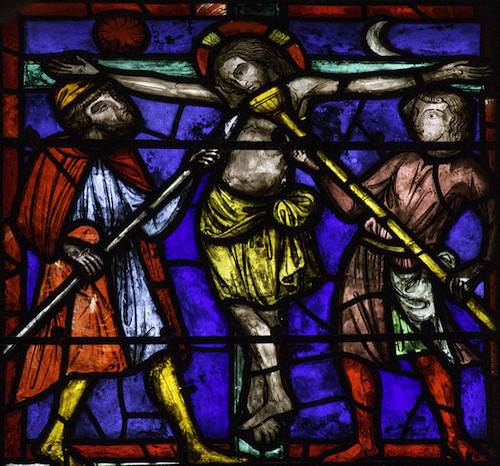We run our website the way we wished the whole internet worked: we provide high quality original content with no ads. We are funded solely by your direct support. Please consider supporting this project.

The Perfect Love of God
The Father, Son and Spirit exist as the infinite intensity and unsurpassable perfection of eternal love. We know this about the triune God not by speculation but because Jesus demonstrated that love (Rom 5:8) in his willingness to go to the furthest extreme possible to save us. When the all-holy God stooped to become our sin and our God-forsaken curse, which is the very antithesis of himself (2 Cor. 5:21; Gal. 3:13), he revealed the kind of love that God is. This is a love that could not possibly be made greater than it is.
Nothing could possibly reveal the love of the Trinity more than the God-forsakenness of the cross, as demonstrated when Jesus cries out, “My God, my God, why have you forsaken me?” (Matt 27:46). For the truth is, no sacrifice could possibly be greater than for Son of God to experience God-forsakenness on our behalf. How could anything be further from the Trinity—united in unsurpassable, intense love—than for God to experience his antithesis?
To support this claim, I want to quote a few people. Feldmeier and Spieckermann observe that Jesus’ revelation of God’s very nature as love “attained perfection in his Passion.”[1] Anders Nygren states that in the New Testament, “the Cross of Christ and the love of God are viewed as one.”[2] And Michael Gorman reasons: “If on the cross Christ conformed to God, then God ‘conforms’ to the cross.” In this light, Gorman argues, we can only conclude that “[t]he cross is the interpretive, or hermeneutical, lens through which God is seen; it is the means of grace by which God is known.”[3] In my estimation, there could not be a revelatory insight that is more important than this one.
The Crucifixion cannot be regarded as merely one of the many acts Jesus engaged in during his earthly life. Nor should we think that it is a mere contingent fact that God’s love is fully revealed on the cross, as though God could have just as easily expressed it in some other way. We need to grasp the logic inherent in the revelation of God in the God-forsaken criminal hanging on Golgotha. The cross is God’s quintessential revelation precisely because the unsurpassable perfection of the love that defines the Triune God throughout eternity is inextricably linked to the unsurpassable extremity of his sacrifice.
God is revealed to be a God whose love could not be improved upon precisely by making a sacrifice of love that could not possibly be improved on. The infinite intensity of the love that unites the three Persons is revealed in the infinite intensity of the pain God experienced when God the Son became his very antithesis and experienced sin and God-forsakenness on our behalf.
In this light, while we must affirm that everything about Jesus’ life and teachings reflects God’s loving character, I submit that it his sacrifice on the cross that does so most profoundly and most unambiguously. And it could not be otherwise, in my view. For only by condescending to dive an infinite distance into our hellish sin and God-forsakenness could the infinite intensity of God’s perfect love be expressed outside the triune community.
[1] Feldmeier, Spieckermann, God of the Living (Waco, TX: Baylor Univerisity Press, 2015), 127,
[2] A. Nygren Agape and Eros, trans. P. S. Watson (London: SPCK, 1953), 117
[3] M. Gorman, Cruciformity (Grand Rapids: Eerdmans, 2001), 17.
Photo credit: Lawrence OP via Visual Hunt / CC BY-NC-ND
Category: General
Tags: Cross, Cruciform Theology, God is Love, Jesus, Triune Love
Topics: Attributes and Character
Related Reading

Why Greg Can’t be Accused of Marcionism (Let’s Not Burn Him at the Stake Just Yet)
Kristin Brenemen via Compfight Richard Beck posted a blog today entitled It’s the Same God: On Marcionism, Creeds, Hermeneutics and War. You’re going to want to take the time to read through it in its entirety. Greg has been accused of Marcionism quite a lot as a result of the working out of his Cruciform…

Nothing but Christ Crucified
One of the most remarkable expressions of the all-encompassing nature of the cross is reflected in an incidental, but extremely important, comment that Paul made in his First Letter to the Corinthians. He noted that when he brought “the testimony of God” to Corinth, he hadn’t come “with eloquence or human wisdom”. He instead “resolved…

Podcast: Isn’t God Withdrawing the SAME as Him Personally Punishing and Causing Violence?
Greg discusses whether the passivity of withdrawal is distinguishable from active punishment. http://traffic.libsyn.com/askgregboyd/Episode_0186.mp3

The Bible is Infallible NOT Inerrant
While the cruciform understanding (explained here) of the “God-breathed” nature of Scripture is in tension with the way most talk about inerrancy (See previous post on inerrancy), I do not believe it is at all incompatible with what the Church has always sought to express by affirming the “infallibility” the Scripture. The core conviction is that Scripture will…

Podcast: How Does God’s Wrath Fit within a Cruciform Theology?
Greg considers God’s wrath. http://traffic.libsyn.com/askgregboyd/Episode_0390.mp3

The Greatest in the Kingdom (2 of 2)
Article by Natalie Frisk This post is a summary of what was discussed at the ReKnew CrossVision Conference in regard to what and how we teach our kids about the cruciform hermeneutic. Taking Jesus into the Old Testament I co-lead a family-friendly home church where we sometimes get into spiritually deep conversations with children. There…
